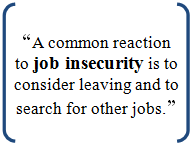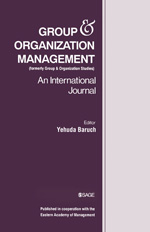Don’t Let Your Best Employees Get Away
Editor’s note: We are pleased to welcome Professor Wendy Marcinkus Murphy of Babson College. She and co-authors James P. Burton of Northern Illinois University, Stephanie C. Henagan of Louisiana State University, and Jon P. Briscoe of Northern Illinois University published “Employee Reactions to Job Insecurity in a Declining Economy: A Longitudinal Study of the Mediating Role of Job Embeddedness,” forthcoming in Group & Organization Management and now available in the journal’s OnlineFirst section.
 As the Great Recession unfolded we were hearing from our students and colleagues that regardless of how long they had been in their workplace or how stable their organization, everyone was feeling some degree of job insecurity. Job insecurity is a classic work stressor that can make employees feel threatened by their organization and provoke strong adverse reactions. A common reaction to job insecurity is to consider leaving and to search for other jobs. The reason employers should care — even in a down economy — is that it is usually the best employees who are likely to find alternative jobs in any context. We wondered what might mitigate this feeling.
As the Great Recession unfolded we were hearing from our students and colleagues that regardless of how long they had been in their workplace or how stable their organization, everyone was feeling some degree of job insecurity. Job insecurity is a classic work stressor that can make employees feel threatened by their organization and provoke strong adverse reactions. A common reaction to job insecurity is to consider leaving and to search for other jobs. The reason employers should care — even in a down economy — is that it is usually the best employees who are likely to find alternative jobs in any context. We wondered what might mitigate this feeling.
 As researchers we had expertise in careers and job embeddedness, but had never considered linking these to job insecurity. Job embeddedness is an important influence on retention. It reflects the web of connections in a job and/or community that people become enmeshed in making it hard to leave their organization. Job embeddedness includes 3 components: fit– how well a job matches other aspects of your life, links– the number of connections you have with people in your company and community, and sacrifice– the tangible benefits you would give up if you left your job or community. The recession provided a strong context to test if job embeddedness could prevent the job insecurity from leading to negative withdrawal outcomes, including intentions to leave and job search behavior.
As researchers we had expertise in careers and job embeddedness, but had never considered linking these to job insecurity. Job embeddedness is an important influence on retention. It reflects the web of connections in a job and/or community that people become enmeshed in making it hard to leave their organization. Job embeddedness includes 3 components: fit– how well a job matches other aspects of your life, links– the number of connections you have with people in your company and community, and sacrifice– the tangible benefits you would give up if you left your job or community. The recession provided a strong context to test if job embeddedness could prevent the job insecurity from leading to negative withdrawal outcomes, including intentions to leave and job search behavior.
Our findings show that indeed job embeddedness is an important variable between job insecurity and withdrawal outcomes. Feelings of insecurity are stressful, thus it is imperative that leaders communicate with employees about any major changes within the organization or the environment to decrease perceptions of threat. Given that job embeddedness plays an important role in mitigating withdrawal outcomes, we advise taking cost-effective steps to engage in long-term career development with your best employees and to establish strong mentoring or coaching programs. These steps should improve employees’ sense of fit with the organization and increase their links to colleagues. In addition, we recommend that organizations encourage employees to be active in their local neighborhoods and develop partnerships with volunteer organizations to increase their embeddedness in the community.
Read “Employee Reactions to Job Insecurity in a Declining Economy: A Longitudinal Study of the Mediating Role of Job Embeddedness” online in Group & Organization Management.
Wendy Marcinkus Murphy is an Assistant Professor of Management at Babson College. She earned her Ph.D. at Boston College. Her current research interests include mentoring and developmental networks, gender, and the work-life interface.
James P. Burton is an Associate Professor of Management at Northern Illinois University. He earned his Ph.D. at the University of Washington. His current research interests include abusive supervision, employee retention, and workplace aggression.
Stephanie C. Henagan is a Visiting Scholar in the Management Department at Louisiana State University, where she also earned her Ph.D. Her current research interests include interpersonal dynamics in the workplace and the effects of social comparison processes on achievement.
Jon P. Briscoe is Professor of Management at Northern Illinois University. He received his DBA at Boston University and a Masters in Organizational Behavior at Brigham Young University. His research interests center around careers, leadership development, and values. He is a past chair of the Careers Division of the Academy of Management and Director of the Cross Cultural Collaboration on Contemporary Careers (the 5C Group).
































































































